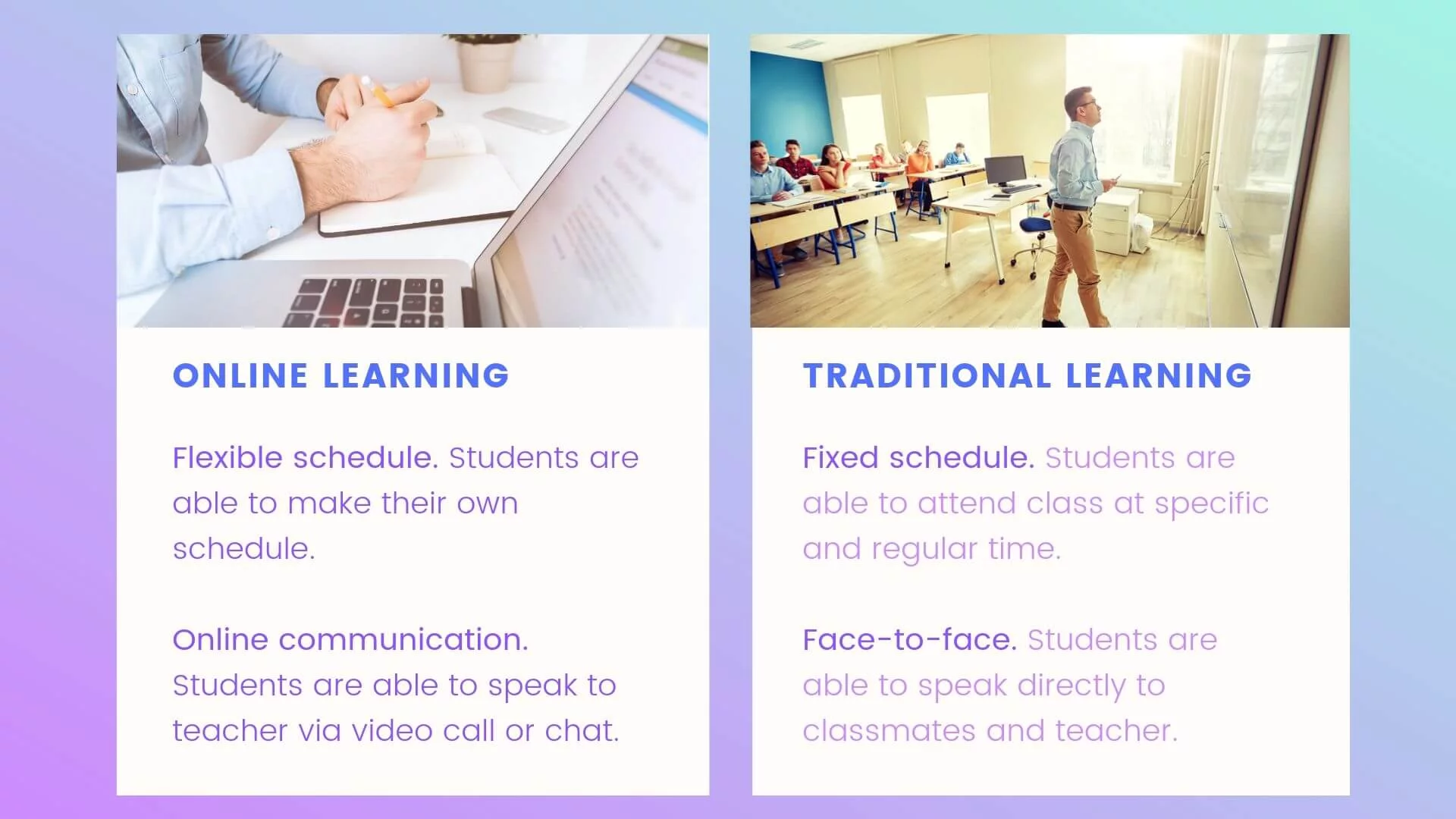
This everlasting battle, “online learning vs traditional learning”, has been gaining traction in recent years.
Traditional Learning vs Online Learning
Summarize with
Content index
Traditional college, with its packed auditoriums and chaotic organization, might be facing disruption. Distance learning is becoming more and more popular each year.
Many students are deciding to forego traditional high education and commit to an online university or a specialized course.
However, some of the arguments for distance learning are still unclear. At one point, it was merely a question of the quality of provided education. Nowadays, dualism in the educational sector is bigger than ever.
The momentum has shifted as high-quality webinars are changing people’s lives and becoming valuable additions to their resumes. However, before we completely turn away from traditional education, it is worth asking how it truly compares with online learning from an objective point of view. Let’s take a closer look at this discussion together.

Flexibility
👉 Online learning
Terrence Young, who works for an assignment writing service, believes online learning offers greater benefits than currently recognized. «With the current economic situation, more and more students see online learning as a great way to improve one’s academic and financial situation.»
For example, you might be a student in college who wants to improve his data science knowledge. Online learning, such as a course in data science, allows you to gain additional knowledge whenever you have free time. As a result, you have a degree and certification that makes you a more promising candidate.
Therefore, online learning offers a flexible timetable addition.
👉 Traditional learning
This method is the best solution if a student or seminar attendee has a flexible work schedule. Some colleges offer a full program of non-mandatory classes, which is suitable for people who thrive on self-organization.
Because of this, free people can attend your seminar instead of being a webinar. But, in terms of developmental psychology, where does discipline stand here?
Read also: Ethical Issues in Online Learning
Discipline
👉 Online learning
For people who have unusual schedules, online education is the ideal choice. Most courses and webinars allow attendees to interact with them only minimally.
Having only a bit of reading and comprehension to do decreases your discipline. Without motivation, you might easily drift off and disregard your studies or webinar.
👉 Traditional learning
Traditional education relied on the idea that physically forcing unmotivated students to attend classes would motivate them. The thinking was, mandatory attendance in a university or seminar would eventually make you learn.
Even if someone didn’t plan to join, they still had to listen to the lecture or talk. Meeting and interacting with colleagues and professors can be helpful, but is it really necessary?
The social factor
👉 Online learning
Although there are stereotypes, online learning does, in fact, involve student-professor interactions. The way to accomplish this is simply different.
You can contact your lecturers or professors via video calls or in an online chat discussion. Or even the forums, which are seeing a rise in popularity.
👉 Traditional learning
For those unmotivated and extroverted, traditional learning is still the best way. You develop a competitive flair by interacting with your colleagues or attendees at a seminar.
The competitive atmosphere would fuel you even if you weren’t eager to attend class or a lecture that day. Motivated people affect others, and you will have an urge to learn and succeed despite initially not having it.
The proposal for a fused model
A mixed educational model has shown to be effective as well, for both universities, seminars and those who these institutions serve.
Every college or organized seminar strives for a goal deeply rooted in ethics and justifies its aggressive marketing with a clear benefit, empowering many people to learn, which is good for society. Attracting many individuals is always the goal, so different students will line up to learn.
Offering quality learning is achievable in both systems. And often, the choice comes to down not because of the learner’s preference but because of external circumstances.
This is why it’s best to participate in a webinar that you can listen to live or via live-streaming. Or if you’re attending a brick-and-mortar university that also offers online courses. People have different preferences that can very well change, so a dual existence is imminent.
Coexistence
The key of both these models is coexistence. One day, you may not feel motivated to attend a course, but a competitive atmosphere will be a reinvigorating factor.
Another day, regular classes can bring disturbances to your work schedule. Combining traditional learning and online learning under a cohesive principle is a state from which we all can benefit.
Summary
In conclusion, comparing online learning vs traditional learning shows that each approach offers its own unique advantages and challenges. Online learning provides flexibility and convenience, allowing people to study according to their schedules and locations. Traditional classrooms, on the other hand, offer structure, discipline, and social interaction that many students find motivating. When both digital platforms and in-person sessions are combined in a hybrid approach, educators and learners can create a stronger and more inclusive education model that fits modern lifestyles. In the end, the most effective approach is the one that meets each person’s needs through thoughtful design and consistent support, bringing together the best aspects of both methods for the best learning results.
FAQ
The main difference is that online learning takes place virtually with learners accessing content and engaging with instructors remotely, whereas traditional education involves attending classes in person with face-to-face interaction between students and instructors.
Both online and traditional learning has advantages and disadvantages, and the better option depends on individual preferences and circumstances. Online learning is more flexible and convenient, but formal education offers more opportunities for social interaction and hands-on learning.
Online learning offers greater flexibility because you can gain additional knowledge whenever you have free time instead of being bound to a physical classroom schedule, which makes it more suitable for people with work or other commitments.
Online learning can reduce the amount of enforced attendance and structure so that without motivation you might easily drift off and disregard your studies or webinar work, making self-discipline more important.
In traditional learning the competitive atmosphere and physical presence of colleagues and professors can fuel motivation while in online learning interactions with lecturers and peers occur via video calls or forums which is different in nature but still provides connection.
Yes, a mixed or fused model combines elements of both online and traditional learning so that students can benefit from flexible access and also from social interaction and hands-on experiences, meaning both methods can coexist rather than one replacing the other.
An expert behind the simplified online meeting and webinar software platform, MyOwnConference. In today’s flexible work environment, Dan offers invaluable life hacks, in-depth reviews, and savvy tips for organizing, promoting, and excelling in virtual conferences and webinars.











